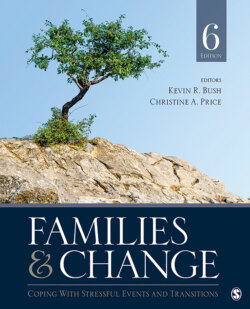Читать книгу Families & Change - Группа авторов - Страница 23
На сайте Литреса книга снята с продажи.
Conclusion
ОглавлениеFamilies today are being challenged with a compelling number of changes and problems that have the capacity to produce stress and crisis. After many years of focusing on individual stress responses, researchers have begun systematic assessments of whole family responses, often by focusing on resiliency. Major theoretical paradigms that have been used to study family responses to stressor events include human ecology models (e.g., Bronfenbrenner, 1979) and family systems models (e.g., Anderson et al., 2013). Developing from Hill’s (1949) work on the effect of wartime separation, various characteristics of stressor events as well as the mediating effects of perceptions and resources have been studied, suggesting that there is nothing inherent in the event per se that is stressful or crisis producing. More recently, family stress research has moved beyond the linear relationship of stressor, buffer or moderator, and response to look at coping and adaptation as a process that continues over time—that is, how families actually manage stress or crisis. Coping is conceptualized as an ongoing process that facilitates family organization but also promotes individual growth. Increasingly, the outcome of interest is adaptation, that is, the ability of a family to make needed changes and ultimately recover from stress and crisis. Adaptation, like coping, however, should not be perceived as a definitive end product because families are always growing and changing. Further, the serenity and stability synonymous with adaptation are not always functional for family members and for some families the response to a stressor event may result in a higher level of functioning. Finally, emphasis on the resilience of families has received increasing attention. By acknowledging the ability of families to successfully manage stressful events, scholars are broadening our understanding of how some families thrive in the face of adversity.
